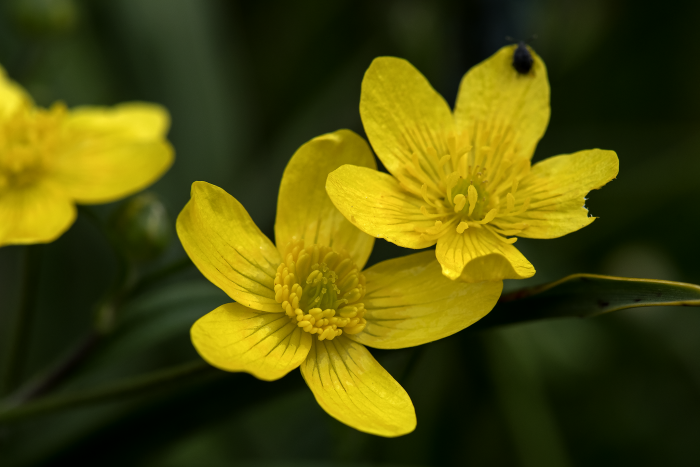Western Buttercup
(Ranunculus occidentalis)
Western Buttercup (Ranunculus occidentalis)
/
/

David Badke
CC BY-SA 4.0
Image By:
David Badke
Recorded By:
Copyright:
CC BY-SA 4.0
Copyright Notice:
Photo by: David Badke | License Type: CC BY-SA 4.0 | License URL: http://creativecommons.org/licenses/by-sa/4.0/ | Rights Holder: David Badke | Publisher: iNaturalist | Date Created: 2017-04-26T05:05Z |







Estimated Native Range
Summary
Ranunculus occidentalis, commonly known as the Western Buttercup, is a perennial herb native to a variety of habitats including moist meadows, grassy slopes, streambanks, and open forest clearings in western North America, from Alaska to central California. It is often found at elevations up to 7218 feet. This species typically grows to a height of 12-18 inches (30-45 cm) with a similar spread. The Western Buttercup has glossy, bright yellow flowers that bloom from spring to early summer, which are highly attractive to pollinators. Its foliage is usually divided into three lobed leaflets, providing a delicate texture in garden settings.
The Western Buttercup is valued for its cheerful flowers and its adaptability to different moisture conditions, although it prefers moist, well-drained soils. It is used in wildflower gardens, meadow plantings, and as a part of native plant landscapes. While it thrives in full sun to part shade, it requires regular water during the growing season to maintain its lush appearance. It is not typically associated with any serious diseases or pests, but it can be toxic to livestock if consumed in large quantities due to the presence of protoanemonin. Gardeners should also be aware that it can cause skin irritation in some people. Despite its traditional use by indigenous peoples, it is not commonly used for culinary or medicinal purposes today due to its toxicity.CC BY-SA 4.0
The Western Buttercup is valued for its cheerful flowers and its adaptability to different moisture conditions, although it prefers moist, well-drained soils. It is used in wildflower gardens, meadow plantings, and as a part of native plant landscapes. While it thrives in full sun to part shade, it requires regular water during the growing season to maintain its lush appearance. It is not typically associated with any serious diseases or pests, but it can be toxic to livestock if consumed in large quantities due to the presence of protoanemonin. Gardeners should also be aware that it can cause skin irritation in some people. Despite its traditional use by indigenous peoples, it is not commonly used for culinary or medicinal purposes today due to its toxicity.CC BY-SA 4.0
Plant Description
- Plant Type: Herb
- Height: 0.5-2 feet
- Width: 0.5-1 feet
- Growth Rate: Moderate
- Flower Color: Yellow
- Flowering Season: Spring
- Leaf Retention: Deciduous
Growth Requirements
- Sun: Full Sun, Part Shade
- Water: Medium, High
- Drainage: Medium
Common Uses
Bee Garden, Bird Garden, Butterfly Garden, Deer Resistant, Low Maintenance
Natural Habitat
Moist meadows, grassy slopes, streambanks, and open forest clearings
Other Names
Common Names: Meadow Buttercup, Buttercup
Scientific Names: , Ranunculus occidentalis, Ranunculus alceus, Ranunculus arcuatus, Ranunculus bongardii subsp. douglasii, Ranunculus bongardii var. douglasii, Ranunculus bongardii var. tenellus, Ranunculus ciliosus, Ranunculus douglasii, Ranunculus eisenii
GBIF Accepted Name: